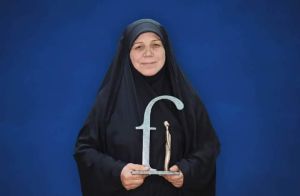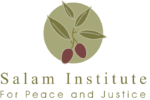
Voice of Peace: FATIMA aL-BAHADLY: The Network for Reconciliation and Forgiveness in the Arab REGION
Our Voice of Peace column initiated in October reflects the learning and expertise that encompasses the above-mentioned network established earlier this year by the Salam Institute for Peace and Justice in collaboration with the Al-Hayat Center- RASED.
The establishment of the Reconciliation and Forgiveness network in the Arab Region was a concluding outcome of the reconciliation and forgiveness-related conference held in Jordan from May 27th -29th, 2023 that brought together 35 civil society representatives, media professionals, and academics, engaged in conflict resolution and peacebuilding efforts in their communities from diverse locations in the Arab region. The Arab region which has its diverse conflict-based challenges is also rich in its cultural tapestry and traditions of peacebuilding. Representing the 11 Arab region countries that participated in the conference in Jordan and resulting in eight months of preparation, meetings, and coordination, the much-awaited network was finally launched.
In the darkest of circumstances, peacemakers emerge, yet their inner motivations remain a profound mystery to many. What drives them to undertake their perilous journey, at times even at the cost of their own lives or the lives of their loved ones? They celebrate the cause of peace, for which some are tragically sacrificed, while others persevere as champions. They embody qualities such as forgiveness, tolerance, resilience, and empathy, believing these virtues to be the cornerstones of a sustainable world.
Throughout the month of October, Our Voice of Peace, a member of the Network for Reconciliation and Forgiveness in the Arab Region, proudly spotlights the remarkable Women peacemaker and human rights defender, Fatima Al Bahadly, hailing from the city of Basra in Southern Iraq. Fatima’s unwavering commitment to peace takes on extraordinary significance, given the heartbreaking sacrifice she endured – the tragic assassinations of her two sons. These devastating losses, which occurred in 2019 and 2021, serve as a painful reminder of the immense personal toll exacted in the pursuit of a more peaceful world.
Fatima holds a Master’s degree in Arabic studies. She is the founder of Al-Firdaws Society, an organization focused on protecting women and youth affected by war and strengthening their role in peacebuilding. Al-Firdaws provides literacy, education, and skills workshops and works to bring an end to violence against women in areas where women are most marginalized, including rural areas.
Grounded in the principles of peace and inspired by the values of tolerance and coexistence among individuals of diverse backgrounds and religions, Fatima Al Bahadly emerged as a socially conscious leader from her early teenage years. she harnessed her talents to benefit her local neighborhood by taking on the responsibility of teaching fellow students when she was just around 14 years old.
“My childhood was not easy as my father died in the Iraq-Iranian war when I was 10 years old. From this age onwards my mother taught me self-reliance, I loved teaching and with the difficult situations in Iraq, I devoted myself to educating marginalized groups that don’t have access to adequate education such as women and youth in my area”.
Fatima played a pivotal role in empowering women in Iraq. She instilled confidence in women, recognizing and celebrating their existing roles as wives, mothers, and homemakers. She provided support for women in various aspects, including family-related and financial matters. Fatima also educated women about their human and health rights, offering insights into politics and political participation. Her efforts significantly reduced societal pressures on women in Iraq.
Fatima also played a vital role in tribal conflicts that affected women. her actions led to her being sought out by many neighboring families who looked towards her as a societal leader.
Fatima notes that she was following a tradition of service and female leadership found in her religious heritage. Yet this was misconstrued as ‘Western’ by local militia groups who eventually started to threaten and intimidate her.
Fatima introduced us to a concept known as “Fasliyah.” This term is used to describe a deeply rooted and archaic practice within tribal communities in Southern Iraq where, if a member of one tribe kills a member of another tribe, it triggers a cycle of retribution. In some cases, as an act of resolving the conflict and preventing further revenge between the tribes, women are offered compensation for the life that was taken. Astonishingly, in the instance Fatima witnessed in 2015, up to 40 women were exchanged to settle such disputes.
She used the resources of her organization and collaborated with influential religious leaders within these tribal communities. Together, they recognized that this practice had no basis in their religious values. These religious leaders began incorporating messages against “Fasliyah” into their Friday sermons, using their influence to bring about change.
Thanks to this concerted effort, women who were held captive were eventually liberated and reunited with their families. Fatima, in particular, played a pivotal role in securing the freedom of 40 women.
Fatima was also passionate about promoting coexistence and social cohesion between different communities in Iraq. As the Sunni-Shia conflict intensified during the later years of Saddam Hussein’s rule, Fatima took proactive steps to promote tolerance amid the escalating violence. She played a crucial role in mitigating the intense Sunni-Shia sectarian tensions in Iraq, even during the most violent periods, while also advocating for the protection and safety of the Christian minority group.
“I opened my house to Christians fleeing conflict situations and also to Sunni families who rejected the atrocities committed by ISIS in their areas and they escaped to the south, my area. I wanted to send a message to my community, who are all Shia that not all of Sunnis are affiliated with ISIS and are our enemies, we share common values and we should spread peace and coexistence among all the Iraqis.”
To be a peacemaker in a bloody vicious conflict, demands navigation through dangerous power dynamics within that context, especially as a women peacemaker. Fatima had nurtured resilience within her heart as a God-given bounty but yet, she breaks down as she talks about the successive killing of her two sons.
In 2019, Fatima’s son, Ahmad, fell victim to militant groups and lost his life hanging at the hands of extremist groups. Despite her devastating loss, Fatima continued her work, emphasizing that Ahmad had always supported her peacebuilding efforts, unwavering in his belief in their importance, no matter how challenging the circumstances.
In 2020, Fatima received three international human rights awards for her transformative work, impacting numerous lives and showcasing her remarkable resilience. However, militant groups in Iraq falsely attributed these accolades to her collaboration with foreign sides.
In 2021, they targeted her eldest son, Ali Karim, kidnapping and subsequently killing him with gunshot wounds to the head and chest.
“After these tragic incidents of killing my two sons, I lost all hope for humanity reigning this world. I could not continue in the mission I had taken upon. For months I struggled with the irony that my values of promoting peace and reconciliation resulted in the assassination of my two sons the most precious people in my life, it set my heart and soul on fire.” she states.
Nevertheless, earlier this year she resolved to return to be of service to her people. One of the pivotal factors that rekindled her passion for re-engaging in peacebuilding was the invitation extended by the Salam Institute to participate in the establishment of the Network for Reconciliation and Forgiveness in the Arab Region
“In fact, it is this network creation that motivated me to once again act on my passion for prompting peace in my country. Such a network is a very powerful mechanism of keeping the solidarity of peacemakers of the region and helps to strengthen their resolve to overcome even the most unimaginably painful situations that arise as part of their commitment to usher in peace in the world”.
Fatima’s voice toward forgiveness and reconciliation demonstrates the real values of the network for forgiveness and reconciliation through her painful story. Last year she was widely quoted in social media citing the statements she gave in a media interview where she was asked what she would do if the killers of her son were identified and her answer was that she would forgive them.
“All my life I worked towards encouraging peace, forgiveness, and coexistence amongst diverse communities. As such these aspects I will preserve for even those who murdered my sons. If they are found, I will forgive them,” she states and emphasizes that justice and forgiveness are two entwined as well as independent needs for societies to thrive. Fatima also stated “It’s certain the killers have mothers and sisters, women and people who loved them. I wouldn’t want them to suffer the way I suffered the loss of my sons.”
Her vision for the Network for Reconciliation and Forgiveness in the Arab region is to empower more women as agents of change and to see women’s leadership become synonymous with global peace leadership.
“Women are those who keep the peace within the household, thereby the peace of the world. This makes them the most needed resource in these challenging times the world is going through”.
Fatima firmly believes that the network has the potential to be a powerful voice for the millions of people in the Arab region who are facing the challenging journey to find peace. Her vision is one of optimism and determination, and she envisions this network as a catalyst for fostering meaningful dialogue among communities that have long been estranged from one another. She sees it as a driving force that can bring about transformative change within societies, helping to bridge divides, heal wounds, and usher in a more harmonious and equitable future for all. Fatima’s unwavering commitment to this cause and her dedication to promoting peace and unity in the region serves as a beacon of hope for a brighter tomorrow.
We disseminating this newsletter in October, which marks the 23rd anniversary of the adoption of the United Nations Security Council Resolution 1325 on Women, Peace, and Security, the first UN resolution that recognized women’s leadership role in achieving peace and security as well as their indispensable contribution to conflict resolution and peacebuilding, Fatima’s story and unwavering dedication serve as a poignant reminder of the essential role that Arab women must assume within the Arab region to ensure the enduring sustainability of peace.
